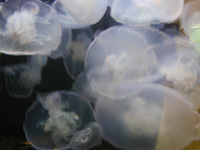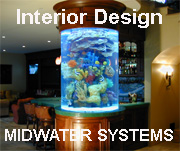|
Can I keep Jellyfish at home ?
Yes and No, it depends on who you talk to. A few
things for sure, you obviously need a source of jellyfish and you need
a specific system to hold them, as well as, a regular supply of planktonic food.
The truth is that jellyfish are NOT easy to keep,
and only advanced hobbyists should try it !
There are those who feel that public aquariums
and academic type people are the only ones capable of maintaining jellyfish.
This is true, as they have the resources and the knowledge. On the other
hand, there are a few individuals who have, or are, perfecting the systems,
foods, as well as, learning how to propagate or raise jellyfish in captivity.
Midwater Systems has
developed a custom acrylic
jellyfish tank, called the Jelliquarium, and is working on holding systems used to keep
these midwater collections and gelatinous organisms in
suspension. Until recently the only source for live jellyfish
was to collect them yourself or public aquariums. In general, most public
aquariums are prohibited from providing or selling them to anyone other
than other academic institutions.
Lately though, there have been a few people who
have either entered into the market, or have plans to enter that market,
and offer various species of jellyfish, systems and food supplies for sale.

The jelly that is being most commonly raised is
the Aurelia aurita species, or commonly called the Moon Jellyfish. The methods of raising these jellyfish are slowly
becoming more perfected, although supplies are no where near marketable
amounts.
Aside from the livestock supply aspect of owning
a jellyfish tank, one needs to be aware of the specific requirements of
that tank. Since jellyfish are physically delicate, are prone to flow with
the current, are suspended by the current, and it's that current that brings
them their food, their tank has to be specially designed to meet all those
needs. The tank is called a Kreisel.
A Kreisels design is one in which there are uniquely
designed inlets and outlets for the water, as opposed to a single inlet
and outlet for water. It has to be introduced in so that it is a gentle
tumbling type flow and keeps the jellyfish suspended. It has to be drawn
out in a similar manner that it does not 'suck' the jellies into the filter
system. The basic idea I think of is similar, in some ways, to your clothes
dryer. Water ( as opposed to hot air in the dryer ) is introduced around
a perforated or specially screened cylinder, and it causes that water to
gently circulate its inhabitants. Likewise the water leaving the kreisel
needs to exit in a manner that does not take the jellies with it.
Aside from the design of the jellyfish tank is
its filtration. This type of filter is very similar to a coral reef tanks.
It should involve surface skimming, mechanical and chemical filtration,
as well as, a effecient biological filter. It would also be a good idea
to incorporate a protein skimmer too. Overall water quality is paramount
!
In addition to the tank and its filtration
Moon jellyfish
require cold water. Since they live in waters that range from 55 to 65
degrees you WILL need a refrigeration unit.
Ok, so now you have the jellyfish, the tank with
its special design, and have incorporated the proper filter system and
chiller unit....what are you going to feed the jellyfish ?
In nature, jellyfish ( Aurelia species for the
sake of this article ) feed on plankton. Fortunately
enriched brine shrimp, shaved mysis shrimp can be the substitute for plankton.
Recently a product called Cyclopeeze has been introduced as a substitute food
source.
Did I also mention that the jellyfish require MULTIPLE feedings on a DAILY
basis ?
One other thing to mention, lighting. Since jellyfish
( Aurelia ) dont require light, the only illumination needed for the tank
is so that you can see the jellyfish. This is a good thing as it minimizes
the number of times you have to place your hand into that tank with COLD
water and those creatures who sting < s >.
So, are you still interested in a jellyfish tank
?
Midwater Systems has
developed a custom acrylic
jellyfish tank, called the Jelliquarium, and is working on holding systems used to keep
these midwater collections and gelatinous organisms in
suspension. Click here for information on the

or
browse the links below for more information on..... |














